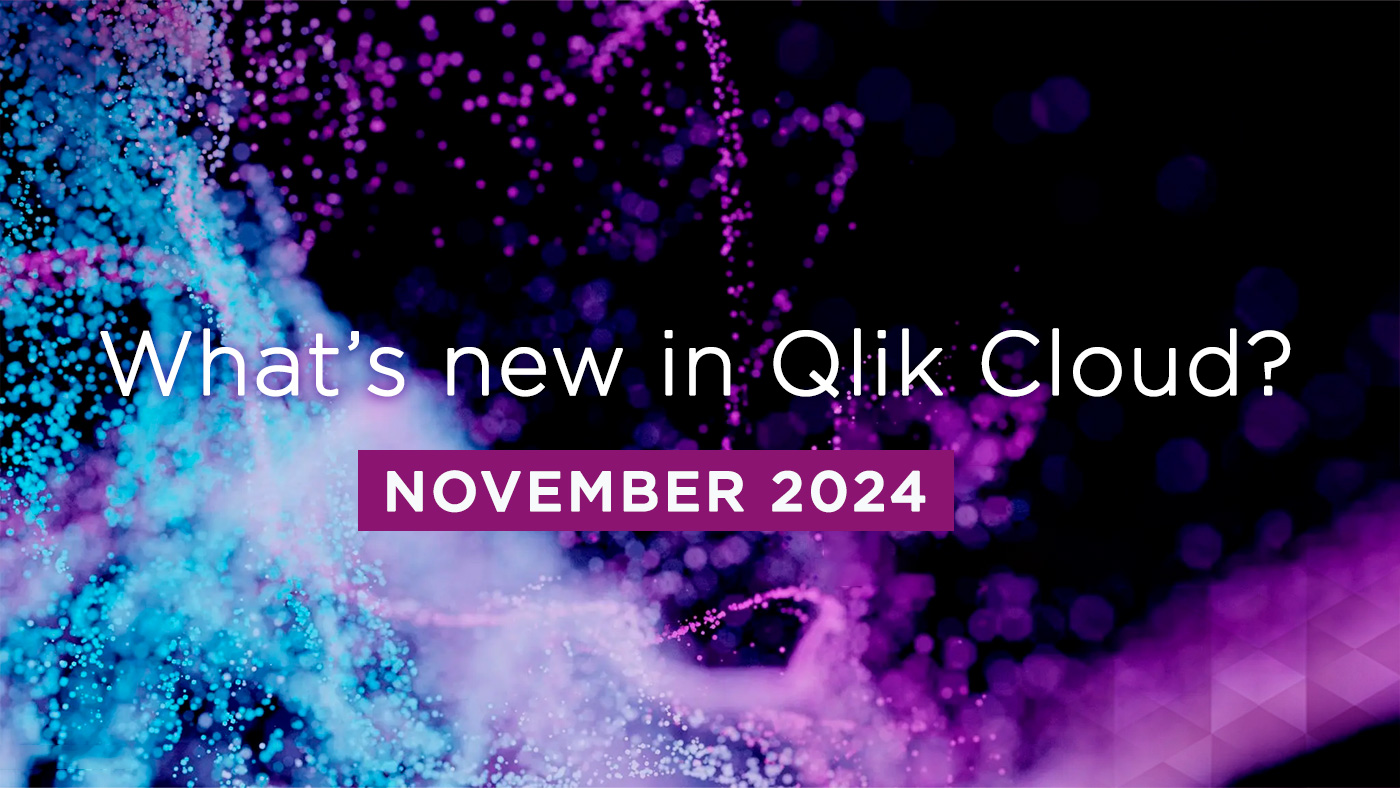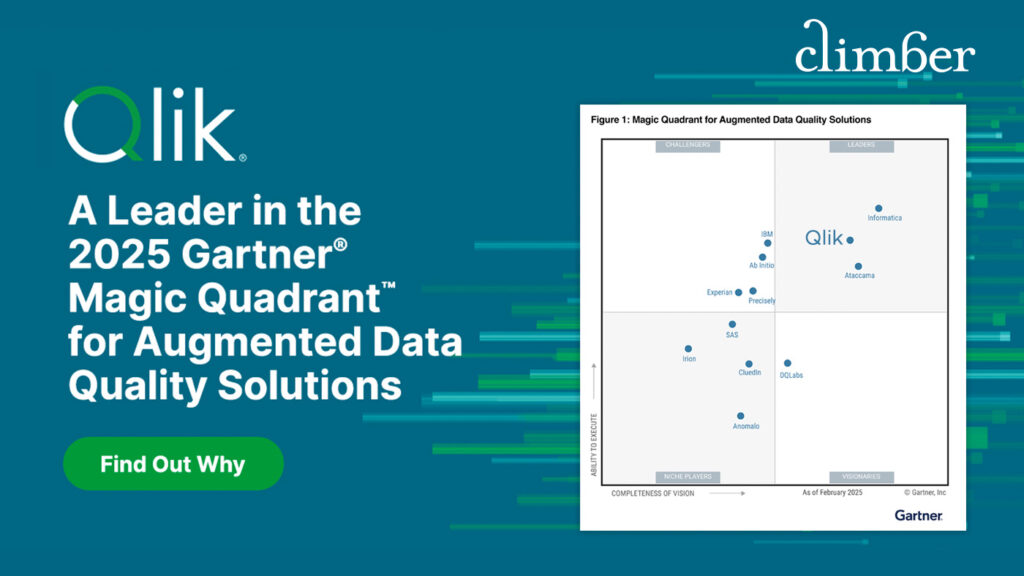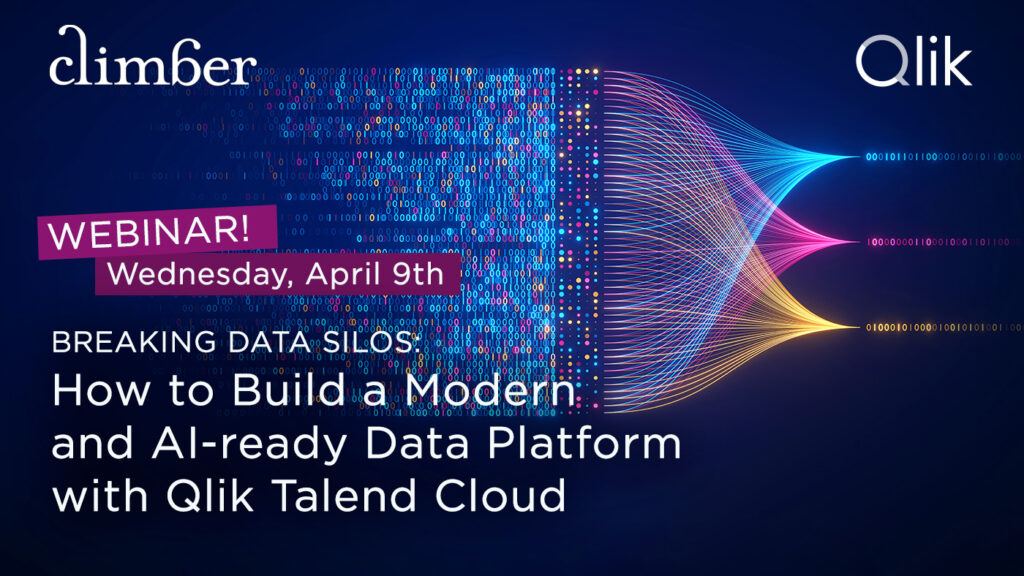
What’s New in Qlik Cloud
– November 2024 Updates –
Welcome to the next edition of the ‘What’s New in Qlik Cloud’ blog for November 2024.
Authors: Roger Gray, BI Manager & Tom Cotterill, BI Consultant, at Climber.
Data Analytics
Qlik continues to push the boundaries of analytics with new features in Qlik Sense, including powerful JSON support, enhancements to Direct Access Gateway, and a suite of styling and automation tools to streamline data handling, visualisation, and integration. Here’s a breakdown of the latest updates.
1. Hierarchical Data File Management
Qlik has introduced Enhanced File Management, allowing users to structure files in directories and subdirectories. With batch actions like move, copy, cut, and paste, managing files has never been easier. This capability significantly improves the management of data assets on the platform and helps users maintain a well-organised data environment.
2. Enhanced Usability in the Selection Bar
The selection bar now uses custom labels for master dimensions rather than raw field names, making it easier to create and manage multilingual applications. This will replace the raw field name with the master dimension name in the selection bar, for a more user-friendly experience.
3. Native JSON Support in Qlik Sense
JavaScript Object Notation (JSON) is a standard text-based format for representing data and extensively used in web applications. With native JSON support, Qlik Sense now allows direct loading and parsing of JSON files, making it easier than ever to work with unstructured data.
Here’s how this new capability empowers users:
- Direct Loading: JSON files can be loaded directly into Qlik Sense without needing additional connectors, saving time and resources.
- Wildcard and Multi-File Support: Users can combine multiple JSON files, even if file structures differ, for greater flexibility in data handling.
- Dynamic Model Creation: Qlik Sense dynamically models data from various source files, making it more adaptable to complex data sources.
- Large File Handling: Qlik Sense now supports larger and more complex JSON files, accommodating diverse data use cases.
- Enhanced UI for JSON: The JSON data load wizard simplifies setup with wizard-driven steps, reducing setup time and enhancing user experience.
In addition, JSON files are now supported in the Qlik Cloud Catalog for data profiling, giving users greater insight into their JSON datasets.
4. Streamlined Access with Qlik Anonymous Access
Qlik Anonymous Access allows users to share analytics content without requiring individual user accounts. This feature supports embedded content (via qlik-embed) and direct links to Qlik Sense applications, broadening engagement possibilities with partners and stakeholders without managing user accounts.
5. Enhanced Customisation and Styling Options
Qlik has introduced new styling options, making it easier to customise the look and feel of charts and tables:
- Selection Bar Styling: Users can now style the selection bar using custom themes for a cohesive visual experience.
- Straight Table Styling: Additional styling options include background colours, font customisation, grid styling, and hover colour options, enhancing the aesthetics and readability of tables.
- Chart Background by URL: Users can add dynamic backgrounds to charts, tables, and map icons using external URLs or data URIs, providing greater flexibility and design possibilities.
6. Direct Access Gateway 1.6.9
The Direct Access Gateway has been updated to version 1.6.9, featuring several upgrades:
- Process Isolation by Default: This mode is now enabled by default, enhancing security. For existing users upgrading, previous isolation settings will be preserved.
- Simplified Configuration: To reduce errors, the configuration.properties template file has been removed, with a single file now located at C:ProgramDataQlikGateway. This version also addresses various issues, so upgrading is recommended to take advantage of the latest security and stability improvements.
7. Qlik Application Automation Enhancements
Several new automation features have been added to Qlik Application Automation:
- Get Chart Image Block: This feature allows users to generate chart images within automation workflows, making it easy to distribute insights across applications.
- Execution Token Renewal: Automations now support token renewal directly from the Start block, ensuring workflows continue running without interruption.
8. New Qlik Sense Features for Machine Learning
Qlik Sense is also making strides in Machine Learning (ML) with updates aimed at optimising training and experimentation:
- Time-Aware Training: Users can now use date-based parameters as test-train splits for experiments, making it ideal for time-sensitive datasets.
- Exporting ML Datasets: Datasets used for testing during model training can now be exported for further analysis, facilitating a seamless flow from model training to data evaluation.
- Localised Embedded Analytics: Embedded analytics in ML experiments now supports localisation based on the user’s language, making analytics accessible to a broader global audience.
9. Improved Platform Security and Access Control
Qlik has also improved security and access control:
- Key Pair Support for OIDC Identity Providers: Qlik now supports public-private key pairs when using OpenID Connect Identity Providers, ensuring secure user authentication.

Data Integration
The below Qlik Talend Data Integration updates enhance data management, quality, and security. These features boost efficiency and ensure high-quality, secure data management across diverse sources.
1. Data Integration: Deleting Projects
Projects and their included tasks can now be deleted in one click, as long as the tasks are not running.
2. Transformation Flows: Added Support for Amazon Redshift
Amazon Redshift can now be used as a target. Both graphical and SQL based transformations are now available to facilitate data remediation.
3. Freshness Indicator for Enhanced Data Quality of Datasets
In QTC Enterprise the Freshness Indicator shows in real time the freshness of data. The Freshness Indicator is updated whenever the data pipeline processes new information, ensuring users have up-to-date insights into their datasets.
4. Customisable Data Quality in Qlik Talend Data Integration
Customisable Data Quality enables users to define and manage data quality rules tailored to their specific business requirements. This enhancement allows for the creation of custom validation criteria, ensuring data accuracy and consistency across various datasets.
Users can apply these rules to monitor and maintain data quality effectively, aligning with standards and improving overall data governance.
Additionally, it is now possible to configure the sample size by row number or a percentage of the dataset. There are two processing modes available:
- Pullup Mode: This mode is available for all supported datasets. It triggers the quality computation within Qlik Cloud, processing the data sample locally.
- Pushdown Mode: Currently, this mode is exclusive to Snowflake datasets. It initiates the quality computation on the Snowflake side, leveraging Snowflake’s processing capabilities. This approach can enhance performance, especially with large datasets, as it reduces data movement by processing data in place.
Pushdown Mode is available when Snowflake serves as the source dataset. This method leverages Snowflake’s computational resources, potentially improving efficiency and performance during data quality assessments.
5. Qlik Talend Data Integration Improvements
There have been multiple improvements to the data movement gateway with several issues being resolved. Follow this link for a list of resolved issues and instructions on upgrading the data movement gateway.
6. Additional Qlik Talend Cloud Application Connectors
Additional connectors have been added with a focus on insurance and security. These ready-to-use connectors eliminate the need for custom development, making it easier for companies to streamline insurance processes and rapidly assess security risks and compliance.
The new connectors include:
- Guidewire BillingCenter
- Guidewire ClaimCenter
- Guidewire InsuranceNow
- Guidewire PolicyCenter
- Invicti
- LevelBlue USM Anywhere
- Microsoft InTune
- Sophos
7. Expanded Data Quality Computation for Broader Data Sources
Users now have enhanced capabilities to perform data quality checks on a wider variety of sources, supporting not just Snowflake but also SQL databases and popular file formats like CSV, XLS, and XLSX.
This enables data teams to apply quality profiling across more datasets, improving reliability and consistency.
Key features:
- SQL Databases: The new pull-up computation now covers any registered datasets from SQL sources, allowing data teams to profile these databases without the need for additional tools.
- File-Based Sources (CSV, XLS, XLSX): Teams can perform data quality checks directly on structured file formats, adding versatility to Qlik Talend’s data profiling capabilities and enabling quality assurance across various data storage methods.
- Enhanced Snowflake Support: Push-down computations remain available for Snowflake, leveraging its processing power for fast, scalable data quality management.
8. Snowflake Target Connections in Data Integration now support Key-pair Authentication
Utilising key-pair authentication, organisations can enhance the security of their data workflows. Key-pair authentication is a more secure alternative to traditional username/password methods and is recommended for high-volume tasks like data replication, data landing, and transformations.
More information can be found here.
9. AI processor for Transformation Flows
Qlik Talend Cloud now offers a dedicated AI processor within transformation flows, designed to seamlessly integrate with Databricks’ AI capabilities. This processor brings seven advanced gen AI functions:
- Sentiment Analysis: Evaluates text sentiment, useful for customer feedback and social media analysis.
- Grammar Correction: Automatically corrects grammar issues, enhancing text data quality.
- Translation: Enables multi-language support by translating text into desired languages.
- Text Summary: Condenses lengthy text data into concise summaries, ideal for report generation.
- String Similarity: Measures similarity between text strings, supporting data matching and deduplication.
- Data Masking: Protects sensitive data by masking personally identifiable information.
- Classification: Automatically categorises data, streamlining data organisation and segmentation.

Summary
Qlik’s latest updates demonstrate their commitment to user-friendly, flexible, and powerful analytics. From advanced JSON support to streamlined automation and file management, these features reflect Qlik’s drive to empower users with the tools needed to handle complex data with ease.
Keep exploring these updates to get the most out of your Qlik analytics and integration experience!
SUBSCRIBE
Want to stay up to date with the latest features that are released in Qlik Cloud?
Subscribe to our blog and get monthly updates directly to your inbox.
WANT TO KNOW MORE? CONTACT US!
Jordy Wegman
BI Manager
jordy.wegman@climber.nl
+31 6 11 62 68 58
Bas Haarhuis
Sales Manager
bas.haarhuis@climber.nl
+31 6 39 46 39 65
Nieuws

The Data Literacy Imperative – Why your business can’t afford to ignore it
A recent Gartner report ranks poor data literacy among the top five barriers to the success of data and analytics initiatives. Discover strategies to bridge the data literacy gap and empower your team to make informed, data-driven decisions.
>> Read more
Qlik a Leader in the 2025 Gartner Magic Quadrant for Augmented Data Quality Solutions
Gartner has published the 2025 Magic Quadrant for Augmented Data Quality Solutions. After evaluating 12 top vendors, they have once again named Qlik a Leader—marking the sixth time!
>> Download the report
Breaking Data Silos: How to Build a Modern and AI-ready Data Platform with Qlik Talend Cloud
Want to be able to respond faster to business challenges and foster a data-driven culture? Then join this webinar to learn how Qlik Talend Cloud can help you reduce the complexity of your data architecture.
>> Register now!
